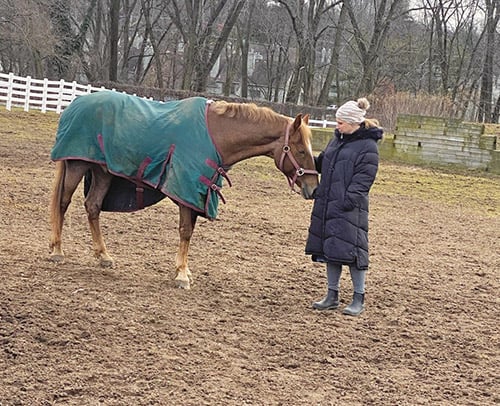
In a previous article I discussed the benefits of equine therapy for mental illness, and how it has helped me personally. I wanted to share a powerful lesson that the horses (along with the therapist) helped me learn.
Ever since I have found equine therapy and some new medication adjustments, my treatment-resistant depression has been a lot more tolerable and, dare I say, more “under control” than not. Because I have suffered with it for so many years, I’ve been relearning how to live my life in the present, take advantage of each day, and get used to my outside emotions reflecting my innermost ones. This may sound like an easy feat but for someone like me who has suffered with this for so much of their life it was actually proving to be quite difficult, until the other day.
My therapist decided to take a new approach to how I interact with the horses. Usually, I work with one horse in particular and walk and groom him. Today she took me out to one of the rings where a few horses at a time are let out of their stalls to wander around and stretch out each day. I had never met any of these horses. With ambivalence, I followed her into the ring. I noticed that about four horses were in the ring just standing around. When we entered, one of them came up to us and brushed its body against mine.
These proved to be very friendly and intuitive horses. My therapist challenged me to take each of the horses for a walk but without the horse being attached to a lead rope (which is how I normally walk them). Taking a horse for a walk can be somewhat intimidating because you have to look in the direction you want to go, in addition to being mindful that the animal doesn’t accidentally step on your foot. (Horses weigh between 1,000-2,000 pounds.) Now doing this without a lead rope—I was even more nervous!
I started walking and checked behind me to see if any of the horses were following me. One of them was, so I kept walking. However, I kept looking to make sure that the horse was still there and it wasn’t about to step on my foot. Each time I looked behind me, the horse stopped walking. At one point when I stopped, it started to nudge me forward as if it was telling me to keep walking! My therapist kept telling me to keep my head up and stop looking behind me but it’s something that’s so habitual that it’s hard to stop.
Upon reflection afterwards, I learned that I don’t need to worry about my past anymore. I’ve done countless trauma programs and it is something that I have worked hard on. Each time I looked back, I lost focus of what I was doing and instead concentrated on the horse and everything that was behind me. It was holding me back from going forward.
It’s challenging focusing on living in the present instead of focusing on the past or the future. That’s why grounding techniques and mindfulness exercises have recently become more popular in classrooms and work environments. We live in a world of fidget toys, wobble seats and putties. All of these are used to help children focus in the classroom or any other necessary environment. It doesn’t need to be because of a mental health issue; grounding techniques and mindfulness are for everyone. There is also jewelry one can wear and textured phone cases to help one stay grounded and in the moment.
It’s definitely not easy to stay in the moment, especially with all of life’s distractions. With Pesach coming up soon, it’s easy to get caught up in the cleaning and preparing for the holiday. Plus there’s always that crumb that you find on Pesach, and you overanalyze if you cleaned everything enough rather than just enjoying the holiday. But this is one of the reasons why we wish each other a Chag Kasher Vesameach.
Yesterday is history, tomorrow’s a mystery, today is a gift, that’s why they call it the present.
Shelli Sussman is the founder of RinaLi Mental Health, a comprehensive worksheet of mental health providers recommended by others in the community that can be viewed anonymously. Most of the providers are in network with insurance. For access to the spreadsheets and updates, follow RinaLi Mental Health on Facebook or Instagram, or email Rinalimentalhealth@gmail.com










